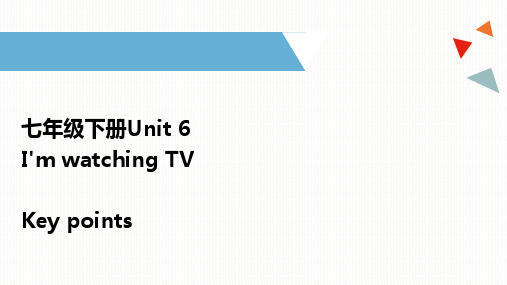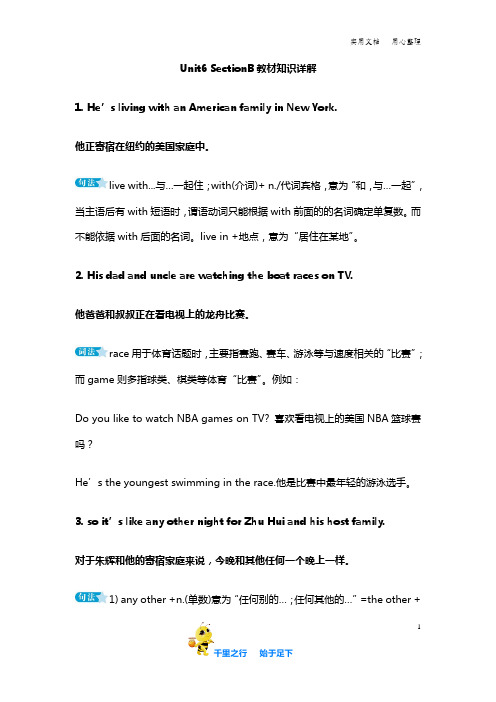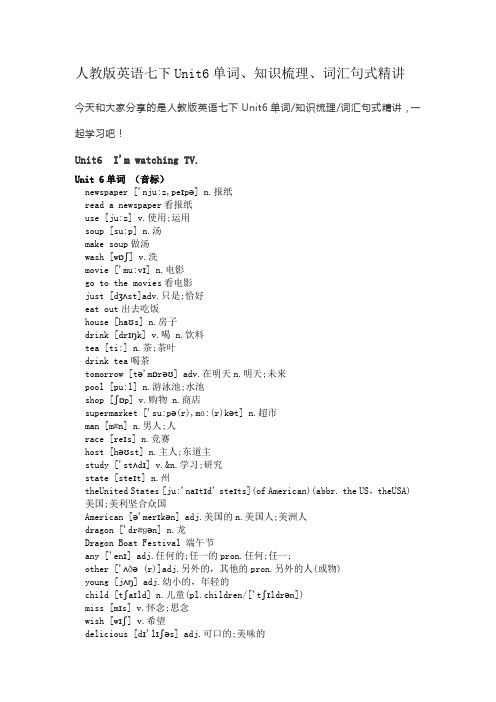人教版七年级英语下册Unit 6 课文+单词+朗读+知识梳理+词汇讲解+句型解析
人教版七年级英语下册Unit 6 I’m watching TV 知识点总结课件(26张)

Thanks for watching!
miss
v. 想念 后加n或者v-ing,不加to do形式 I miss studying with you together! I miss you so much.
Miss 指未婚的女士 Miss. Li
wish
wish to do
希望做...
wish someone to do 希望某人做...
house
house 房子 home 家 family 家庭
词语 house
用法 房屋、住房、住宅,指家人所居住的建筑物
例句
We are going to move to the new house. 我们将迁入新房。
family
家人、家、家庭,是一种社会意义上的团体,不 My family are early risers.
hope (to) do hope someone to do X
He wishes his whole family to spend this holiday with him.
语法
定义
表示说话的当下正在进行或发生的动作
我正在8点正在写作业 I am doing homework right now.
any other
..., so it's like any other night for Zhu Hui and his host family. any other 任何其他的... 后接名词 Would you like any other book?
Next time
七年级下册Unit 7
重点句型
This is...
Hello? This is Jenny. (P.32)
人教PEP七年级英语下学期Unit6_SectionB教材知识详解

Unit6 SectionB教材知识详解1.He’s living with an American family in New York.他正寄宿在纽约的美国家庭中。
live with...与…一起住;with(介词)+ n./代词宾格,意为“和,与…一起”,当主语后有with短语时,谓语动词只能根据with前面的的名词确定单复数。
而不能依据with后面的名词。
live in +地点,意为“居住在某地”。
2.His dad and uncle are watching the boat races on TV.他爸爸和叔叔正在看电视上的龙舟比赛。
race用于体育话题时,主要指赛跑、赛车、游泳等与速度相关的“比赛”;而game则多指球类、棋类等体育“比赛”。
例如:Do you like to watch NBA games on TV? 喜欢看电视上的美国NBA篮球赛吗?He’s the youngest swimming in the race.他是比赛中最年轻的游泳选手。
3.so it’s like any other night for Zhu Hui and his host family.对于朱辉和他的寄宿家庭来说,今晚和其他任何一个晚上一样。
1) any other +n.(单数)意为“任何别的…;任何其他的…”=the other +1名词复数意为“同一围内除了某人或某物以外的其他人或事物”。
any+n.(单数) 意为“任何一个/任意一个”,用于肯定句,起强调作用。
any+名词复数/n(不可数)意为“一些”,用于疑问句或否定句中,肯定句中some。
如:Any other student in the class can play with you.班里其他的任何一个同学都可以和你玩。
2) host family指人们出国时所借宿的人家,类似汉语中“房东家”。
例如:Do you want to learn to speak English well?Why not go to England and stay with a host family?你想学说一口好的英语吗?为什么不去英国与房东一家人住在一起呢?4.Zhu Hui misses his family and wishes to have his mom’s delicious zongzi.朱辉思念他的家人并且希望吃上他妈妈做的可口的饺子。
人教新目标七年级下册 第六单元知识点总结讲练

人教版英语七下Unit6单词mp3、知识梳理、词汇句式精讲Unit6 知识梳理【重点短语】1.watch TV看电视2. read a newspaper 看报纸3. talk on the phone 通过电话交谈4. listen to a CD 听CD5. a useful book 一本有用的书6. make soup 做汤7. wash the dishes 洗碟子8. go to the movies 去看电影9. at home 在家10. eat out 在外面吃11. drink tea 喝茶12.Dragon Boat Festival 端午节13. make zongzi 包粽子14. watch the boat races 看龙舟比赛15. the night before the festival 节日前的晚上16. any other night 任何其他的晚上17. his host family 他的寄宿家庭18. read a story to sb 读故事给某人19. miss sb. 思念某人miss doing sth 错过做某事20. wish to do sth希望做某事wish sb to do sth希望某人做某事hope to do sth希望做某事21. no place like home 没有地方像家一样22. in the United States 在美国23. study for a test 为一个考试而学习【重点句型】1.一What are they doing?他们在干什么?—They’re listening to a CD.他们在听光碟。
2. That sounds good.那听起来挺不错的。
3. Not much,I'm just washing my clothes. What about you?没忙什么,只是在洗衣服.你呢?4. Do you want to join me for dinner? My parents aren't at home. We can eat out.你愿意和我一块吃晚饭吗?我爸妈不在家,我们可以下馆子吃饭。
人教版初中英语七年级下册Unit6SectionA教材全解

人教版初中英语七年级下册Unit6SectionA教材全解Unit 6 I’m watching TV.Unit 6 Section A教材全解1.watching TV看电视【重点注释】watch TV看电视。
watch a game观看一场比赛。
watch a soccer game 观看一场足球比赛。
[注意]watching TV的watching是现在进行时的v.ing形式,如果写词组“看电视”可以直接表达为watch TV,而不需要说watchingTV;如果在现在进行时的句子中,要表达“正在看电视”,也不是watchingTV,而应该是be(am/is are) watching TV。
(以下出现的动词词组类同,不再赘述)2.cleaning打扫卫生【重点注释】clean此处用作不及物动词,意为“打扫,清理”。
例如:I spent all day cooking and cleaning.我一整天都忙着做饭和打扫卫生。
【拓展记忆】①clean作及物动词,意为“清扫”。
例如:He is cleaning his room.他正在清扫他的房间。
②clean作形容词,意为“干净的”,在句中可作定语、表语或宾语补足语。
例如:The classroom is very clean today.今天教室很干净。
We must keep our classroom clean.我们必须保持我们的教室干净。
③cleaning作名词,意为“打扫,清理”,常构成短语do some/the cleaning,意为“打扫卫生”。
例如:Tom helps his grandfather do some/the cleaning every Sunday.汤姆每星期日都帮爷爷打扫卫生。
④cleaner作名词,意为“清洁工;保洁员”。
例如:His uncle is a cleaner.他叔叔一个清洁工。
3.reading a newspaper读报纸(看报纸)【重点注释】newspaper为可数名词,有单复数形式,它是有news“新闻,消息”(不可数名词)+paper“纸,纸张”(不可数名词)构成的复合词。
季七年级英语下册 Unit 6 I’m watching TV课文重难点讲解(无答案)(新版)新人教版

Unit 6 I'm watching TV课文重难点讲解【教师寄语】:A friend in need is a friend indeed. 患难见真情。
Section A1. reading a newspaper读报纸【解析】Newspaper “报纸”(可数名词)( ) — Do you know who won the high jump?—Sorry, I don’t . Here’s a _____ for sports . You can read it.A. newspaperB. mapC. pictureD. camera2.wait for +人或物等待某人或某物We __________(wait ) for the bus at the moment.3. I’m watching TV.我正在看电视【解析】⑴此句为现在进行时的陈述句形式,其结构为“主语+be(not)+v.ing形式+其他”,表示目前正在进行或发生的动作。
I am cleaning my room.我正在打扫我的房间。
Tom isn’t doing his homework.汤姆没在写作业。
⑵watch TV 为固定短语,意为“看电视”。
例如:My grandmother often watches TV in the day.Do you like watching TV?你喜欢看电视吗?He is watching TV.他正在看电视。
⑶watch /read/see/look 的辨析(1) watch v “观看,注视“看电视、看比赛用Watch。
watch TV 看电视 watch football match 看足球比赛(2) read 看 ----读书看报用readread the book 看书 read magazines 看杂志(3) see v “看见,看到” ---指看电影、看病,强调看的结果用seesee the film =go to the movies 看电影 see the doctor 看医生(4) look at 看强调看到具体动作 ---看黑板,看地图用look atlook at the blackboard 看黑板4. That sounds good. 那听起来不错。
人教版七年级英语下册Unit6知识点归纳

人教版七年级英语下册Unit6知识点归纳Unit 6: I'm Watching TV - Summary of Key PointsIn this unit。
we learn several ___ activities。
festivals。
and wishes。
Some of the key phrases include "watch TV," "read a newspaper," "talk on the phone," "listen to a CD," "make soup," "wash the dishes," "go to the movies," "at home," "eat out," "drink tea," "Dragon Boat Festival," "make zongzi," and "watch the boat races."We also learn about the grammar structure of ___'s current activity using "What + be + subject + doing?" and "Subject + be + doing something." nally。
we learn how to express our wishes using phrases such as "I'd love/like to do something" and "wish to do something."Finally。
人教版英语七下Unit6单词、知识梳理、词汇句式精讲

人教版英语七下Unit6单词、知识梳理、词汇句式精讲今天和大家分享的是人教版英语七下Unit6单词/知识梳理/词汇句式精讲,一起学习吧!Unit6 I'm watching TV.Unit 6单词(音标)newspaper ['nju:z,peɪpə] n.报纸read a newspaper看报纸use [ju:z] v.使用;运用soup [su:p] n.汤make soup做汤wash [wɒʃ] v.洗movie ['mu:vɪ] n.电影go to the movies看电影just [dʒʌst]adv.只是;恰好eat out出去吃饭house [haʊs] n.房子drink [drɪŋk] v.喝 n.饮料tea [ti:] n.茶;茶叶drink tea喝茶tomorrow [tə'mɒrəʊ] adv.在明天n.明天;未来pool [pu:l] n.游泳池;水池shop [ʃɒp] v.购物 n.商店supermarket ['su:pə(r),mɑ:(r)kət] n.超市man [mæn] n.男人;人race [reɪs] n.竞赛host [həʊst] n.主人;东道主study ['stʌdɪ] v.&n.学习;研究state [steɪt] n.州theUnited States [ju:'naɪtɪd' steɪts](of American)(abbr. the US,theUSA)美国;美利坚合众国American [ə'merɪkən] adj.美国的n.美国人;美洲人dragon ['dræɡən] n.龙Dragon Boat Festival 端午节any ['enɪ] adj.任何的;任一的pron.任何;任一;other ['ʌðə (r)]adj.另外的,其他的pron.另外的人(或物)young [jʌŋ] adj.幼小的,年轻的child [tʃaɪld] n.儿童(pl.children/['tʃɪldrən])miss [mɪs] v.怀念;思念wish [wɪʃ] v.希望delicious [dɪ'lɪʃəs] adj.可口的;美味的still [stɪl] adv.还;仍然living room ['lɪvɪŋ]客厅Steve [sti:v]史蒂夫(男名)Laura ['lɔ:rə]劳拉(女名)Unit6 知识梳理【重点短语】1.watch TV看电视2. read a newspaper 看报纸3. talk on the phone 通过电话交谈4. listen to a CD 听CD5. a useful book 一本有用的书6. make soup 做汤7. wash the dishes 洗碟子8. go to the movies 去看电影9. at home 在家10. eat out 在外面吃11. drink tea 喝茶12.Dragon Boat Festival 端午节13. make zongzi 包粽子14. watch the boat races 看龙舟比赛15. the night before the festival 节日前的晚上16. any other night 任何其他的晚上17. his host family 他的寄宿家庭18. read a story to sb 读故事给某人19. miss sb. 思念某人miss doing sth 错过做某事20. wish to do sth希望做某事wish sb to do sth希望某人做某事hope to do sth希望做某事21. no place like home 没有地方像家一样22. in the United States 在美国23. study for a test 为一个考试而学习【重点句型】1.一 What are they doing?他们在干什么?—They’re listening to a CD.他们在听光碟。
人教版七年级下册Unit 6 I’m watching TV.(section A)知识点讲解

Unit 6 I’m watching TV.Section A1. newspaper(1) newspaper(cn.) “报纸”read a newspaper read newspapers 看报纸in the/a newspaper在报纸上(不能用介词on)morning /evening newspapers 晨报/晚报(2)newspaper 由news(新闻)和paper(纸)构成的合成词。
bed + room→ bedroom 卧室cla ss + room →classroom 教室head + phone →headphone 耳机police + man→ policeman 警察basket + ball→basketball 篮球(3) news (un.)“新闻”,作主语时谓语动词用单数形式。
Eg: News is important in our lives.(4) paper (un.) “纸”,“一张纸”:a piece of paper。
2.talking on the phone (with sb.)(1) on the phone 通过电话on是介词,表示“通过...,以...的方式”on the radio 通过收音机on the computer 在电脑上on the Internet 通过互联网on TV在电视上(2)phone (n.) 电话= telephone (v.) 打电话make a phone 打电话answer the phone 接电话phone number 电话号码phone book 电话簿phone sb. = call sb. 给...打电话3. use(1) use (v.) 使用、运用形容词: useful,“有用的,有益的”use… for… = use… to do… 用…做…be used for doing sth. = be used to do sth. 被用来做某事Eg: We can use the machine to listen to tapes. 我们能使用这个机器听磁带。
- 1、下载文档前请自行甄别文档内容的完整性,平台不提供额外的编辑、内容补充、找答案等附加服务。
- 2、"仅部分预览"的文档,不可在线预览部分如存在完整性等问题,可反馈申请退款(可完整预览的文档不适用该条件!)。
- 3、如文档侵犯您的权益,请联系客服反馈,我们会尽快为您处理(人工客服工作时间:9:00-18:30)。
1. newspaper(1)newspaper意为“报纸”,是可数名词。
“在报纸上”用英语表示为“in the/a newspaper”,不能用介词on。
我们日常所说的晨报/晚报是morning / evening newspapers。
例如:She likes collecting old newspapers. 她喜欢收集旧报纸。
(2)newspaper是由news和paper构成的合成词,合成词是一种重要的构词法,对我们记忆单词很有帮助。
例如:bed + room→ bedroom 卧室class + room →classroom 教室head + phone →headphone 耳机police + man→ policeman 警察basket + ball→basketball 篮球2. use(1)use 动词,意为“使用,运用”;其形容词形式为useful,意为“有用的,有益的”。
例如:Can I use your phone?我能用一下你的电话吗?Thanks for giving me such a useful book.谢谢你给我这么一本有用的书。
拓展:use&withuse动词在句子中作谓语,表示用途。
I use the pen to write. 我用钢笔写字。
with介词在句中作状语,表示方式。
I write with a pen. 我用钢笔写字。
(2)use 也可以作名词,意为“使用,用途,用法”。
不过此时的读音为/ ju:s /。
例如:I’m sure you’ll think of a use for it.我相信你会给这东西找到用途的。
3. moviemovie 是名词,意为“电影”。
“go to the movies” 意为“去看电影”,同意短语有“go to the cinema, go to see a film”。
例如:I often go to the movies with my classmates on weekends.周末我经常和我的同学去看电影。
拓展:movie&filmmovie是美式英语,the movies 指电影院;“go to the movies”是美式英语的“去看电影”。
例如:Let’s go to the movies. 我们去看电影吧。
film是英式英语,英式英语中去看电影是“go to the cinema/ go to see a film”。
例如:I have seen a very interesting film recently.最近我看了一部非常有趣的电影。
4. just(1)just可以作副词,意思是“正好,恰好”;也可以表示“刚才,刚刚”,常用于肯定句。
例如:That’s just what I wanted. 那正是我所要的。
I’m just out of hospital. 我刚刚出院。
(2)just 还可以作形容词,意为“公正的,正义的,公平的”。
例如:This was a just decision, so everyone accepted it.这是一个公平的决定,所以大家接受它。
5. drink(1)drink 可作动词,意为“喝,饮”。
如果是不及物动词,有“喝酒”之意。
例如:I want to drink some water. 我想喝些水。
Don’t drink and drive. 不要喝酒驾车。
(2)drink作不可数名词,意为“饮料”;作可数名词,意为“一杯或者一份饮料”。
例如:What kind of drink would you like? 你想要什么饮料?I want three drinks. 我想要3杯饮料。
6. shop(1)shop可用作动词,意为“购物”;“go shopping/do some shopping”意为“去购物”。
常见的类似用法还有:go swimming /do some swimming去游泳go skating去滑冰 go fishing去钓鱼go boating去划船 do some reading阅读do some washing洗涮 do some cooking做饭do some speaking多说 do some listening多听(2)shop 可用作名词,意为“商店”。
例如:Let’s go to the shop. 让我们去商店吧。
拓展:shop, store&supermarket1)store 和shop 作名词时,均有“商店,商场”之意,基本上可以通用,美国人常用store,英国人常用shop。
store和shop作动词时,分别意为“储藏”和“购物”。
例如:These vegetables are stored for this store.这些蔬菜是为这家商店储藏的。
Mrs. Green often shops at the shop near her house.格林夫人经常在她家附近的商店里买东西。
2)supermarket 指自选市场,往往比store,shop 经营规模大,经营时间长。
例如:She likes doing shopping in the supermarket, because she thinks a supermarket has more goods than a shop.她喜欢到超市买东西,因为她认为超市的货物比商店的货物多。
7. racerace 名词,意为“竞赛”。
relay race 意为“接力赛”,100-metre race 意为“百米赛跑”。
例如:I won the 100-meter race. 我赢了一百米赛跑。
拓展:race&game二者都有比赛的意思,区别如下:(1)race 主要表示赛跑、赛马(车、船)等速度方面的比赛,指从起点到终点的比赛。
例如:a horse race 赛马 a 10-kilometer race 10公里赛跑(2)在美式英语中,game指决定胜负的游戏,通常有一套规则,凡参加者均需遵守。
不管是户内或者户外,脑力或者体力的比赛,都可以叫game。
英式英语中则用match,此时game与match可以互换。
例如:a football game 足球比赛a basketball game 篮球比赛the Olympic Games 奥林匹克运动会8. study(1)study 作动词,意为“学习,研究”,其第三人称单数为studies。
例如:He studies in a Chinese school. 他在一所中国学校学习。
拓展:study&learn1)study 侧重于学习的过程。
用于表示较高深或者周密的“研究”。
例如:He is studying the math problem. 他正在研究这个数学问题。
2)learn 侧重于学习的结果,意为“学会”,用于初级阶段的学习。
“learn from sb.”意为“向某人学习”。
例如:He learns English on the radio. 他通过广播学英语。
(2)study 还可以作名词,意为“学习,书房”。
例如:He went swimming after an hour’s study.他完成一个小时的研究后去游泳了。
My father is reading newspapers in his study.我爸爸在书房里看报。
9. else 和otherelse和other都是形容词,意为“别的;其他的”。
但两者用法不同。
(1)else常用于修饰不定代词,疑问代词或疑问副词,也可以修饰all, much, little 等词,修饰这些词时,else要位于其后,作后置定语。
例如:Would you try something else?你要试试别的吗?Nobody else in my school comes fromAmerica.我们学校没有其它人来自美国。
Are you going anywhere else?你们另外还要去哪里?(2)other 作形容词,用以修饰名词或代词,作定语。
例如:Where are the other books?其他的书在哪里?Do you have any other questions?你还有别的问题吗?(3)other作代词,可以单独作主语、宾语、表语,其复数形式为others. 例如:Some students are playing under the tree. Others are flying kites over there.一些学生在树下玩,还有一些在那边放风筝。
10. miss(1)miss 作动词,意为“怀念,思念”,后可以接名词、代词或者动名词作宾语。
例如:She missed her mother badly.她非常思念她的母亲。
I missed working with you.我怀念和你一起工作的时光。
(2)miss 作动词还可以表示“错过,没赶上”。
例如:He arrived too late and missed the train.他到的太晚,没赶上火车。
I missed the chance to go to college.我错过了上大学的机会。
(3)miss 的首字母大写,即Miss,意为“小姐,老师”。
通常用于未婚女性的姓氏前。
例如: Miss Li is our English teacher.李老师是我们的英语老师。
11. househouse 名词,可以指“房子”,也可以指“家”。
例如:The old man lived in an old house.这位老人住在一栋老房子里。
My house is far from our school.我家离学校远。
拓展:home, family&house词语用法例句ho us e 指“房屋、住房、住宅”,指家人所居住的建筑物。
We are going to move to the newhouse. 我们将迁入新房。
fa mi ly 指“家人、家、家庭”,是一种社会意义上的团体,不指住房。
My family are early risers. 我们全家都是早起的人。
h o m e “家”,指家人共同生活的地方,强调家的气氛和环境,是一个带有感情色彩的名词。
I must go home now. 我现在必须回家了。
12. stillstill是副词,意为“仍然,还”。
例如:The teacher is still at work in his office.老师还在办公室里工作。
